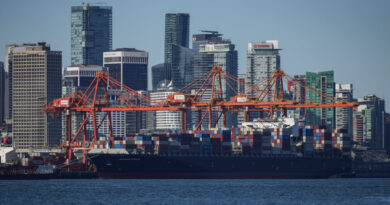Head of Border Patrol Unaware of Agents’ Frustration with Limited Authority to Capture Illegal Crossers
The head of the border agency acknowledged that her officers are frustrated with not being able to take action when they observe individuals crossing the border illegally near a port of entry due to jurisdictional constraints.
“This issue has never been brought to my attention,” Erin O’Gorman, president of the Canada Border Services Agency (CBSA), stated during her appearance before the House of Commons public safety committee on Dec. 3.
O’Gorman informed Conservative MP Raquel Dancho that she became aware of this information through news reports.
“It appears that our border officers are frustrated by the fact that they are unable to apprehend someone who crosses the border just outside their jurisdiction,” Dancho remarked after reading Weber’s statement to O’Gorman.
O’Gorman mentioned that she is willing to work towards addressing the legislative limitations on CBSA’s responsibilities, but emphasized that the final decision lies with Parliament.
CBSA and the RCMP currently divide responsibilities for border security, with CBSA overseeing ports of entry and the Mounties covering the areas between ports of entry.
Public Safety Minister Dominic LeBlanc informed the committee that he is aware of the concerns raised by the border union president and has discussed the matter with RCMP Commissioner Michael Duheme. “We have not made any decisions yet, but we are open to considering it,” LeBlanc remarked.
Recent threats of tariffs by U.S. President-elect Donald Trump have elevated border security to a top priority for politicians. Trump announced on Nov. 25 that he would impose a 25 percent tariff on goods from Canada and Mexico if they do not address illegal immigration and drug smuggling.
LeBlanc testified before the committee after visiting Trump’s residence in Florida alongside Prime Minister Justin Trudeau, where they discussed border security and trade.
LeBlanc mentioned that Trudeau raised concerns about illegal firearms, cocaine, and methamphetamine being smuggled from the U.S. into Canada. “We wanted to convey to the Americans that we not only share their concerns but also have our own,” LeBlanc stated.
Increasing security personnel at the border is complicated by human resources issues and conflicting priorities.
Although LeBlanc did not provide a specific human resources plan for border operations involving CBSA and RCMP, he assured the committee that there will be additional resources in terms of personnel and equipment before Trump assumes office on Jan. 20. “We are finalizing this as a government based on advice from the RCMP and CBSA,” LeBlanc explained.
While the RCMP has a plan to manage a potential surge in migrants leaving the U.S. to avoid mass deportation under Trump, a strategy to prevent an influx in the opposite direction has not been fully developed.
Duheme mentioned that crossing the border constitutes an offense, emphasizing the importance of technology and partnerships with U.S. authorities to enhance security.





